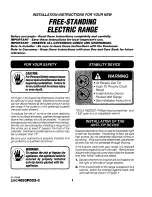
15
Convection Cooking
In a convection oven, the fan-circulated hot air continually
distributes heat more evenly than the natural movement of air in a
standard thermal oven. This movement of hot air helps maintain a
consistent temperature throughout the oven, cooking foods more
evenly, crisping surfaces while sealing in moisture, and yielding
crustier breads.
During convection baking or roasting, the bake, broil, and
convection elements cycle on and off in intervals while the fan
circulates the hot air. During convection broiling, the broil and
convection elements cycle on and off.
If the oven door is opened during convection cooking, the fan will
turn off immediately. It will come back on when the oven door is
closed.
With convection cooking, most foods can be cooked at a lower
temperature and/or a shorter cooking time than in a standard
thermal oven. When using Manual Convect modes, reduce the
time and temperature when setting the oven. Use the following
chart as a guide.
Convection Mode
Time/Temp. Guidelines
Convection Bake
25°F (15°C) lower temperature,
possible shortened cooking time
Convection Roast
Cooking time shortened by up to 30%
Convection Broil
Shortened cooking time
When using Auto Convect modes, the oven will automatically
adjust the time and temperature for the selected mode.
Convect Modes
Manual Convect Modes:
Convect Bake - Multiple-rack baking or cookies, biscuits, breads,
casseroles, tarts, tortes, cakes
Convect Roast - Whole chicken or turkey, vegetables, pork roasts,
beef roasts
Convect Broil - Thicker cuts or unevenly shaped pieces of meat,
fish, or poultry
Auto Convect Modes:
Meats - Chicken: whole and pieces; meat loaf; roasts: pork,
beef, ham
Baked Goods - Biscuits, quick breads, yeast breads, cakes,
cookies, casseroles
Others - Frozen convenience foods: French fries, nuggets, fish
sticks, lasagna, pizza
Proofing Bread
Proofing bread prepares the dough for baking by activating
the yeast. Follow the recipe directions as a guide. Proof should
be used for fresh dough, thawed dough, and for the first and
second rise.
To Proof:
Before first proofing, place the dough in a lightly greased bowl and
cover loosely with wax paper, coated with shortening. Place on
rack guide 2 and close the oven door.
NOTE:
If the temperature of the oven is greater than 120°F (49°C),
“Oven Cooling” will be displayed until the temperature is less than
120°F (49°C).
1.
Press PROOF.
2.
Press START.
Let the dough rise until nearly doubled in size. Proofing time
may vary depending on dough type and quantity.
3.
Press CANCEL when finished proofing.
Before second proofing, shape the dough, place it in baking
pan(s), and cover loosely. Follow the same placement and control
steps above. Before baking, remove the cover.
NOTE:
If the oven temperature is greater than 120°F (49°C), the
display will indicate “Oven Cooling” until the temperature is below
120°F (49°C).
Favorite
Favorite stores the oven mode and temperature for your favorite
recipe. Favorite can only be stored for the upper oven.
To Save a Recipe:
1.
While the oven is being used for Bake, Broil, Convect Bake,
Convect Roast, or Convect Broil, press and hold FAVORITE
for 3 seconds.
2.
The current oven mode, cook time, and temperature will be
displayed. “SAVED” will be displayed. The recipe has been
saved.
NOTE:
Only one recipe can be saved at a time. Saving a new
recipe will overwrite a previously saved recipe.
To Select the Favorite Recipe:
1.
Press FAVORITE. The saved oven mode and temperature will
be displayed.
NOTE:
Favorite does not store cook times.
2.
Press START.
3.
Once the recipe is selected, oven will begin preheating to the
set program.
4.
To change the temperature, press the number keypads to set
the desired temperature.
5.
Press START.
6.
To change the cook time, press COOK TIME.
7.
Press the number keypads to set the desired cook time.
8.
Press START.
9.
Press CANCEL when finished cooking.
















































